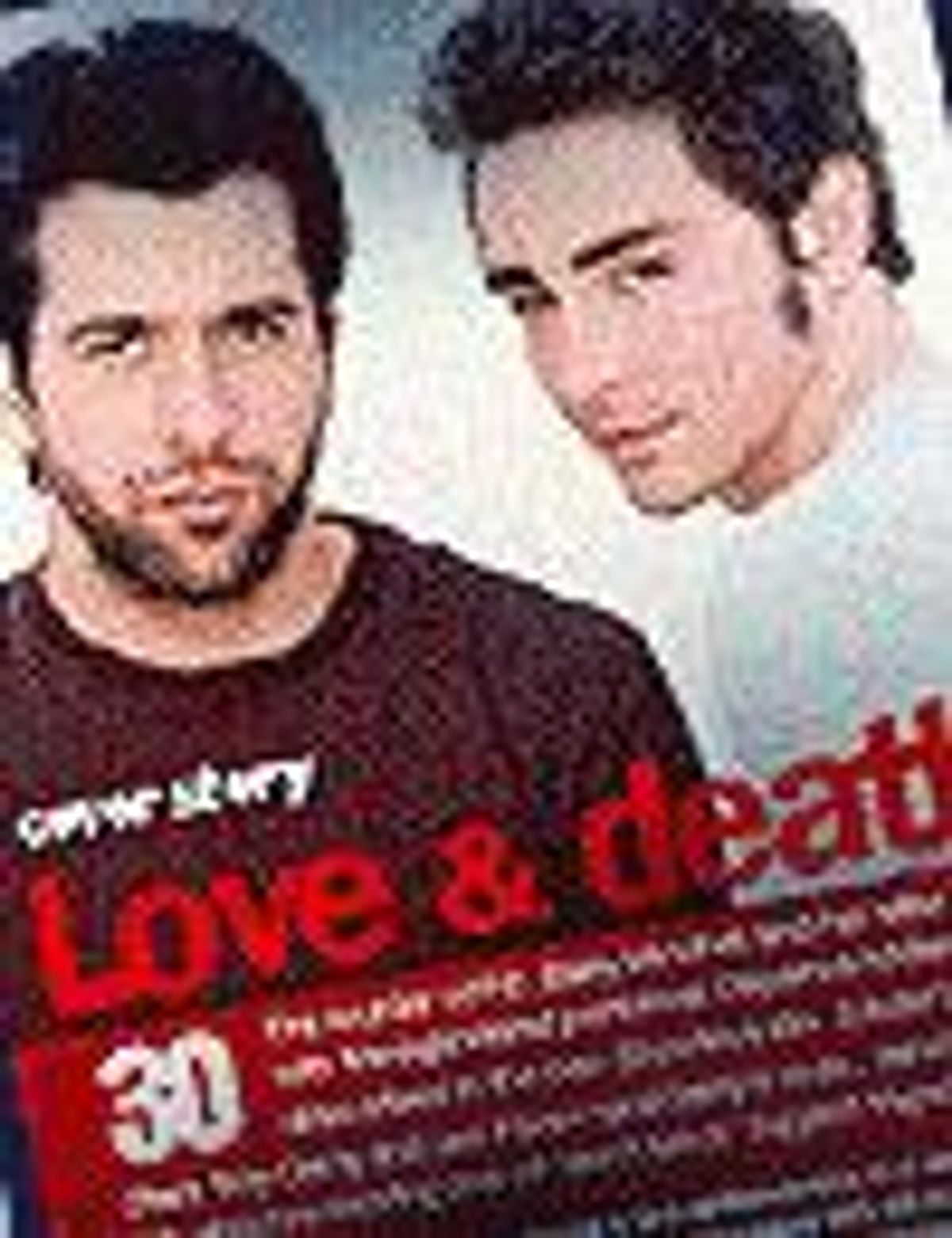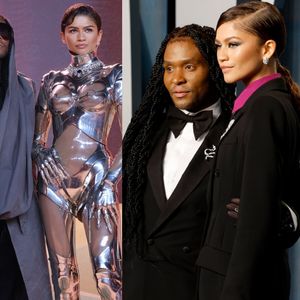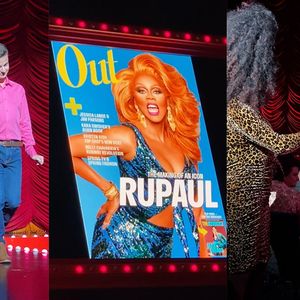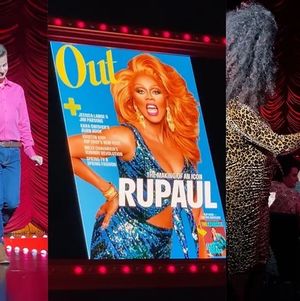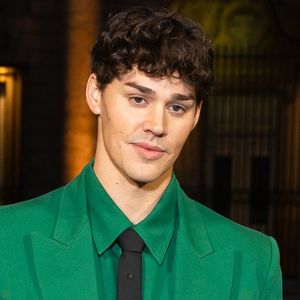It's a
sultry summer evening on the Toronto set of
Soldier's Girl, and the
film's star, Troy Garity, is almost ready to talk
about playing murdered soldier Barry Winchell. The
keyword is almost. Garity has been a distant, looming
presence throughout most of the shoot, accessible to his
immediate colleagues, but wary of most everyone else,
particularly anyone resembling a journalist.
Now, a month into
the filming, it's coincidentally three years to the
day since Pfc. Barry Winchell's death. In the
predawn hours of July 5, 1999, inside the 101st
Airborne infantry barracks at Fort Campbell, Ky.,
Winchell's head was smashed to pieces against his
pillow with a Louisville Slugger baseball bat while he
slept. The force of the blows was such that bits of
brain matter and bone fragments mixed with blood
splattered against the wall behind him like a crimson halo.
Garity was
powerfully affected by the story of Barry Winchell's
short life and brutal death. Inside his
air-conditioned trailer, far from prying eyes, the
actor almost apologizes for his reticence about being
interviewed, conceding that the role is one of the hardest
he's essayed. He lost 15 pounds to play the
part, not only working out with a trainer but also
working on building a house. "I tried to do as much
manual labor as I could," he says; that
included putting up drywall, digging holes, and
smashing tile to bulk up.
Garity is very
much his own man, and crew members have warned me to avoid
bringing up his lineage to him at all costs. Production
staffers feel the actor had fought long and hard to
distance himself from qualifying titles: son of Jane
Fonda and Tom Hayden, grandson of Henry, nephew of
Peter, cousin of Bridget. Garity is his paternal
grandmother's maiden name, and it's
conceivable that a great number of viewers won't make
the Fonda connection at all when they see him
on-screen as Winchell, a role he has been fighting his
way into since shooting began.
"We're four weeks into shooting, and
I'm still finding out things about this
guy," Garity says thoughtfully. "Whenever I
think I have it, I realize I don't. I probably
won't have it until the movie is done and over
and I see it and I'll say, 'Oh, fuck,
that's how I should have done
it.'"
Winchell never
regained consciousness after the beating, and he died at
Vanderbilt University Medical Center the next day. His
murderer, an emotionally disturbed 18-year-old
near-alcoholic Army private named Calvin Glover, had
been steadily provoked and manipulated into a drunken
rage by Winchell's roommate, Justin Fisher, who had
taunted Glover over having lost a fight earlier that
day to Winchell, "a faggot." In the
previous weeks, Winchell had been the object of mounting
antigay harassment, taunts, and slurs because of his
relationship with Calpernia Addams, a transgendered
nightclub performer in nearby Nashville. While the
explanations remain mostly speculative, the affair provoked
Fisher to what appeared to be an obsessive, jealous
fury. Although Winchell was murdered with a baseball
bat, the real weapon appears to have been Calvin
Glover, wielded by Justin Fisher.
The story
captured headlines worldwide, as much for the unprecedented
savagery of the attack as for the other elements: the
increasingly desperate failure of the Army's
profoundly homophobic "don't ask, don't
tell" policy, the prurient hint of forbidden sexual
and romantic scandal, and the near-Shakespearean
tragedy of the circumstances surrounding
Winchell's death. Here was a handsome, clean-cut,
tough, stoic, all-American soldier in the classic
mold--the sort the Army claims to
venerate--murdered for no other reason than suspicion
of homosexuality. Articles in Rolling Stone, Vanity
Fair, and The New York TimesMagazine all asked the same question: Why?
Garity, although
insightful, articulate, and politically precocious, has
a professional armor that doesn't crack until
he's asked at what point the intensity of his
role struck him full force.
"There
were two moments when it became overwhelming," he
says. "Through the process of reading the
script so much and doing a lot of research, I began to
endow [myself with] certain emotions from the script, namely
paranoia and fragmentation"--to the point that
he began imagining that members of the crew were
talking about him behind his back. "This
happened specifically during the week we spent filming Barry
in the middle of the witch-hunt on the
barracks," he says.
"I feel
disgusting saying that," he adds furiously,
"because it has nothing to do with the hell
this kid went through.
"The
second moment," he continues, "was the day we
filmed the murder scene." His voice trails off,
and he takes a deep breath and leans forward, eyes
downcast. When he looks up, his eyes have grown moist.
"They had to put the prosthetics on my head to match
the injuries that this kid endured. And to think of
the misery that this act of complete cowardice cost,
and this poor kid's family..."
His voice is now
thick with tears. "I don't know how to play it
honestly because I didn't know Barry and I
don't know his family. He didn't tell
anybody. Not once in these five months of torture he was
going through did he complain. Not to anybody."
He pauses, brushing away the tears with the back of
his hand. "My goal is to take his face down off the
poster and make him a real person again."
If the specific
details of the last months of Barry Winchell's life
remain visible only as an incomplete mosaic of recollections
by the various people who knew him, much of the
question of "Why?" seems to be answered
by Soldier's Girl. The movie's script
is the fruit of a long fascination with
Winchell's life and death on the part of out
screenwriter Ron Nyswaner (Philadelphia), who
encountered the story in 2000 in one of the magazine
articles detailing the murder and its aftermath.
"I called
my agent on my cell phone and said, 'I've
discovered the story I was born to write, and you have
to make sure I get the chance to write it,'
Nyswaner says. Initially without access to Addams or
Winchell's friends and family, Nyswaner did as
much research as possible via magazines, newspapers,
the Internet, and trial transcripts.
"It always
takes two things to interest me in a drama," Nyswaner
muses, "and they have to be opposed to one
another. There was Barry's Midwestern decency
and Calpernia's articulate and somewhat ironic sense
of herself." Later, when he met Addams,
Nyswaner adds, she told him, "I know my life
has a somewhat Jerry Springer tone to it." Says
Nyswaner: "I thought, This is someone who has
irony and a sense of humor, even though she was
involved in this horrible tragedy. Those two things coming
together interested me.'"
Meanwhile,
unknown to Nyswaner, producers Linda Gottlieb (Dirty
Dancing, Citizen Cohn) and Doro Bachrach (Citizen
Cohn, Truman) were setting up their own
Winchell-Addams project at Showtime. By serendipitous
coincidence, a mutual friend of Nyswaner's and
the producers was at a dinner party and heard Gottlieb speak
about their Winchell film. The friend reported the
conversation to Nyswaner, who tracked down the two
producers and offered himself as screenwriter.
They accepted and
provided Nyswaner with the firsthand source he had been
lacking: Calpernia Addams, who had sold the rights to her
life story to Gottlieb and Bachrach and was a
consultant on their film. The screenwriter was then
able to spend time in Nashville and New York with
Addams while writing, and during the shoot they often spoke
by telephone. Addams also supplied Nyswaner with
material from a memoir she was writing (since
self-published under the title Mark 947). Frank
Pierson (Truman, A Star Is Born) came on as
director, and casting began.
"We
struggled with the role of Calpernia the most,"
Nyswaner says. The actor would have to be believable
as a pre-op transsexual, neither a fully anatomical
woman nor a drag queen. After auditioning countless
actors, the film's creators decided on Lee Pace, an
Oklahoma native fresh out of Juilliard whose audition
had stunned everyone. "Lee's talent was
so spectacular that it seemed obvious to choose him,"
Nyswaner notes, "but we were concerned about
his physical build. He's very tall, very
broad-shouldered, and he's a good-looking, lean, but
hunky guy. In the end, someone said to the director,
'Frank, you always go with talent. The other
stuff can be worked out.'"
On the set, Pace
seamlessly created the illusion that he was Addams, and
he was rarely seen without the three hours' worth of
prosthetics and makeup it took to turn him into a
preoperative transsexual. Male crew members fell
naturally and unconsciously into treating him with
gender-based courtesies: holding doors for him, touching him
lightly on his back as they guided him onto the set.
"I'm clearly a guy," says Pace today,
laughing. He is just back from a weekend in upstate
New York, visiting Nyswaner, during which he acquired
what has become a hellish cold. Dressed in cargo pants and a
sweater, he has regained the weight he lost to play
Calpernia, his eyebrows have grown in, and there is no
real trace of the feminine persona left. A recent
photograph in Details magazine reveals a jockish,
broadly smiling Pace with his arm around costar Shawn
Hatosy. "You're never going to forget
that I'm 6 foot 3," Pace sighs.
"That's never going away, no matter how
many prosthetics you apply.
"As far as
playing a role this specific," he continues,
"I had to just trust that I was a woman and
focus on Troy, falling in love with him and playing
the scenes as honestly as I could."
Pierson advised
Pace to avoid drag clubs and instead watch real women and
let their physical and emotional movements guide his
performance, both when he was alone and in his scenes
with Garity. "Calpernia told me that they did
behave in a very heterosexual fashion," Pace
confides. "She really valued that in him, and
that's what he was comfortable with in
her."
Addams--who
didn't consider Winchell gay and says Winchell
didn't think of himself in those terms
either--visited the Toronto set during the
shooting. She gives Pace high marks for the subtlety and
empathy of his performance. "I walked into the
theater [set, where Pace performs as Addams] and it
felt so eerie," Addams says, "because it was
such a close match to the theater I used to work in.
It had the balcony and everything. There was a moment
when I went into the lobby and peeked through a crack
in the open door and watched Lee, and it was like looking
three years into my past."
Having recently
moved from Chicago to Los Angeles to start a production
company called Deep Stealth, Addams, whose final
gender-reassignment surgery was completed just after
her visit to the set, is tall, slim, titian-haired,
and camellia-petal delicate, and she bears more than a
passing resemblance to Julianne Moore.
"It felt
magical in a way," Addams confides of the time she
spent on the set. "It gave me what I never
thought I would have: a revisitation of places and
moments I thought were gone forever. It was a surreal,
cathartic experience for me."
"Meeting
Calpernia actually got me to tone down my
performance," Pace says. "At the time I
met her, I hadn't shot anything yet, [and] I was
prepared to play her really girly and really flirty and lay
it on really thick. But when I met her, I realized
that she doesn't try that hard. She's
serene. She just is. And she's exactly as complicated
as I thought she would be."
Speaking of the
finished film, Addams is unequivocal. "It's
hard for me to see this film as I would if it
wasn't mine or Barry's story," she says
softly. "It's hard to look at this in a
detached way and judge it as a film, but Troy's
performance was so beautiful. Obviously, he wasn't
trying to clone or duplicate Barry exactly, but he got the
core of it right: the powerful masculinity and the
strength that was held in check by a peaceful, gentle
spirit. The sense you get of Troy on the screen is the
same sense you got of Barry in person: great strength
controlled by a beautiful heart. He could have beaten
up Fisher or Glover anytime he wanted to," she
adds poignantly, "but he was a gentle and good
man."
Almost a year
after that first interview on the set of Soldier's
Girl, Troy Garity is at his Los Angeles home. He has
come in out of the sun, having spent most of the
morning and early afternoon working in his yard. As he
rummages around looking for some after-sun lotion, he
reflects from a greater distance on the evolution of his
performance as Barry Winchell.
"In the
original draft, I think Ron was a little afraid of
Barry," Garity muses. "I don't
know whether that was out of respect or an inability to
define his character. He was initially scripted as this
'gosh, golly' 1950s movie star, so
incredibly chivalrous and shy that you wanted to
vomit." He laughs. "In fact, Barry Winchell,
although very decent and stoic and quiet, was very
firm in his wants and desires. Barry was tougher than
even I was able to portray; here's a guy who was
catching people as they fell out of
helicopters."
"I think I
idolized Barry a little bit," Nyswaner admits.
"I felt I was making a tribute to him--an
homage--and I think I initially erred in my
first screenplay by making him too Gary Cooper-ish and
almost subarticulate. I had always seen Justin Fisher
as an Iago, and I gave him these wonderful, florid
speeches. Troy walked on the set and said, 'Why
is my character not as exciting as the other characters, and
why isn't my dialogue interesting?' And
I took that to heart. Troy really wanted to emphasize
the fact that Barry was a sexual person, that he desired
Calpernia and was turned on to her. He loved rock and roll,
and the sexy heavy-metal rock and roll fan persona
wasn't originally present in my
screenplay."
Garity, growing
up in a politically active Hollywood family, had the
importance of public service instilled in him at an early
age. Balancing his career with activism, Garity is
founder of the Peace Process Network, a worldwide
anti- gang violence network. For the son of Jane
Fonda and onetime California state senator Tom Hayden,
politics is something of a birthright.
"Perfect
parents we weren't," Jane Fonda concedes on
the phone from Atlanta, "but we lived our
politics. It wasn't lip service, and he grew up
with that. And it wasn't always pretty, as I'm
sure he told you. It wasn't easy as a kid to
grow up [in a political environment], and he saw up
close the battle of gender issues. You can trace any issue
back to hierarchy, patriarchy, and power. It's
why gay people, men and women, are so vulnerable, now
more than ever. They challenge the most fundamental
structures of our society. For me, Troy is the perfect man:
He's truly androgynous." Early on,
Garity, who is straight, approached his mother for
advice on the possible impact of playing a potentially
controversial role.
"He called
me up and said, 'Mom, do you think it could hurt my
career to kiss a guy on the lips?' and I
started listing all the actors who'd done it,
and I said no," Fonda recalls. "As a mother,
it wasn't the love scenes that were hard for
me; it was the beating."
"I had
heard about the Barry Winchell incident," Garity
says, "but I had filed it away with all the
other hate crimes I hear about day in and day out. It
didn't really have much gravity in my belly, because
I did't assume it had anything to do with me.
And now I see how gravely wrong I was. I see that the
'don't ask, don't tell' policy
is responsible for the death of Barry Winchell and the
ruination of the lives of those two young men who are
in prison forever, and it moves beyond the military
compound. The policy is something that exists in our
homes and our schools. The preposterous notion that
silence is going to resolve conflict is absolutely
crazy."
Nyswaner points
out that like all great tragedies, the story being told
in Soldier's Girl requires a complex range
of interconnected characters. Some of his most revealing
discoveries in his research were not about Winchell
and Addams but about the killers, Nyswaner says:
"In my research, I found that Justin and Calvin had
very troubled pasts and had been dumped in the Army as
a last resort." Nyswaner spoke to several
sergeants--the officers directly responsible for
enlisted men--who told him off the record that
"there are troubled people in the military who
are sent there as a last resort when schools,
churches, and families fail to help kids," he says.
"One of
the reasons the movie is so disturbing is that Shawn Hatosy
is so good in the role of Justin Fisher,"
Nyswaner says. "He's Iago. He saw that
aspect of the script and ran with it. You never know if
Justin is being completely manipulative or if
occasionally some humanity leaks through. For an actor
to bring that complexity to a 'villainous'
role is a great contribution."
Fisher's
obsession with Barry Winchell struck many involved in the
investigation as excessive. Given Fisher's own
experiences within Nashville's gay nightlife,
he appears to fit the profile of a self-loathing gay
basher: a straight-identified man struggling with his
own sublimated homosexual desires who in a rage annihilates
the person who stirred that same-sex attraction.
Whatever
Fisher's sexuality, Winchell's will never be
known. He related to Calpernia as a woman but,
according to Addams, engaged with all of her
physicality.
"Unfortunately, he died too young," Garity
says. "Sexuality evolves with us. Part of our
journey on this planet is the discovery of our sexuality.
He was attracted to this female figure and was ultimately
able to fall in love. We didn't have the luxury
of asking him questions. He never complained to
Calpernia or his parents. He had a slogan: 'Suck it
up and move on.'"
Likewise,
Nyswaner feels the film will find its audience, gay or
straight, and that everyone who watches it will bring
something of their own to the table. "I write
what interests me," he says, "and what
interested me in this story had to do with universal themes:
people who love unconditionally and people, like
Justin Fisher, who are tortured by repression. These
themes apply to all human beings."
"What I
want people to understand about this film is that the story
goes beyond gay rights," Garity says
thoughtfully. "This goes into the very core and
makeup of our society as a whole. This story is about people
not being able to express themselves and being
punished for difference. And there is no one in our
elected offices who is willing to fucking sit down and
deal with issues of difference. Now we have a situation
where we're at war, and young men like Barry
Winchell are out fighting [in Iraq] not for any
concept of 'liberation' but for the policies
of the corrupt 1% who run this country. We have the
greatest soldiers in the world, and [many of them] are
constantly being abused and betrayed by their leaders.
I can't expect my country to go liberate another
country when we're unable to liberate
ourselves."
Nyswaner also
believes the military is betraying its own members.
"'Don't ask, don't
tell' played an incalculable role in Barry
Winchell's death," he says, steel in his
voice. "The people who crafted it have a lot to
answer for. It's a heinous policy and one of the
great political failings of the Clinton
administration. The implied message is one that all gay
people have had to live with our whole lives:
'We'll pretend you're OK as long
as you don't tell us who you are.'"
